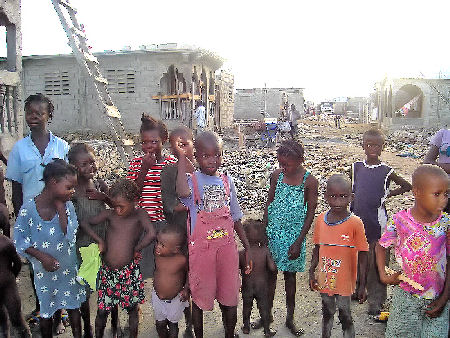Protests in Port of Prince demanding food price cuts
14/04/2008

In Haiti, a drastic increase in food prices sparked deadly rioting over the last three days. Protesters in the capital are calling for President Rene Preval to step down. United Nations troops have restored some calm, and the U.S. Coast Guard is on alert for a migrant exodus.
Hungry Haitians took to the streets, first demonstrating in the normally placid city of Les Cayes and then spreading their protests to the capital. For three days, Port-au-Prince was besieged by violence that has killed at least five people as demonstrators attacked and looted businesses and government buildings.
According to Celigny Darius, national director at SOS Children, the popular disturbances had left no damages in the facilities, nor the co-workers and SOS families. At Port au Prince the family strengthening programme, the SOS School and the national office were closed since April 8. On Friday April 11, some co-workers resumed their activities at the national office, but facing the threat of new street protests, left the premises before the end of the day.
On Wednesday, responding to demonstrators' demands for price relief on foodstuffs for the first time, Mr. Préval promised to subsidize the prices of Haitian-grown products, but refused to do the same for imported food. Leaders of a group of 16 senators who set a deadline for Prime Minister Jacques Edouard Alexis to step down said they scheduled a hearing in the Senate for Saturday for a no-confidence vote.
Food prices rising
Food prices are rising around the world, but perhaps nowhere have they had such a devastating impact than in Haiti, where around 80 percent of the population lives on less than $2 a day. Only Somali and Afghanistan have a higher per capita daily deficit in calorie intake than Haiti.
Thousands of people from the slums took to the streets; while community leaders demanded the government roll back free-market policies and create community stores with subsidized prices.
Much of Haiti's once-productive farmland has been abandoned as farmers struggle to grow crops in soil decimated by erosion, deforestation, flooding and tropical storms. To make a profit, the farms that remain often price their crops sharply higher than imported American products, which benefit from generous U.S. government subsidies.
On Thursday, Haitians slowly resumed their daily activities as a semblance of normalcy appeared to be returning to the Caribbean nation, even as a large demonstration was reported in Arcahaie, one hour north of Port-au-Prince.
In the capital, barbed-wire barricades guarding the presidential palace were gone, peacekeepers removed debris and some businesses timidly reopened their doors. Meanwhile, in Cap Haitien there where no disturbances and SOS work remains normal.
Relevant Countries: Haiti.